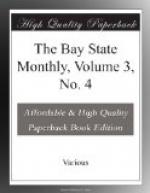Sickness visited several families, and Goody Morse, as was her custom, acted as village nurse. One by one her patients died. John Dee, Mrs. William Chandler, Mrs. Goodwin’s child, and an infant of Mr. Ordway’s, were among the dead. The rumor ran about that Goody Morse was a witch. John Chase affirmed that he had seen her coming into his house through a knot-hole at night. John Gladding saw “halfe of Marm Morse about two a clocke in ye daytime.” Jonathan Woodman, seeing a strange black cat, struck it; and Dr. Dole was called the same day to treat a bruise on Mrs. Morse. The natural inference was that the old lady was a witch and the cause of all of these strange things, as well as of the extraordinary occurrences in her home. Accusers were not wanting, and she was arrested. In her trial all of this evidence was put in, and her husband repeated his testimony at the Powell trial. The county court heard it and passed the case to the General Court, from whence it was returned.
The records abound in reports of the testimony. We will only quote the evidence of Zachariah Davis, who said:—
“I having offended Goody Morse, my three calves fell a dancing and roaring, and were in such a condition as I never saw a calf in before ... A calf ran a roaringe away soe that we gott him only with much adoe and putt him in ye barne, and we heard him roar severell times in ye night. In ye morning I went to ye barne, and there he was setting upon his tail like a dog. I never see no calf set after that manner before; and so he remained in these fits till he died.”
The entry on the court record is as follows:—
“Boston, May ye 20, 1680:—The Grand Jury presenting Elizabeth, wife of William Morse. She was indicted by name of Elizabeth Morse for that she not having ye fear of God before her eyes, being instigated by the Devil, and had familiarity with the Devil contrary to ye peace of our sovereign lord, the King, his crown and dignity, the laws of God, and of this jurisdiction. After the prisoner was att ye barr and pleaded not guilty, and put herself on ye country and God for trial. Ye evidences being produced were read and committed to ye jury.”
“Boston, May 21st, of 1680:—Ye
jury brought in their verdict. They
found Elizabeth Morse guilty according
to indictment.
“May ye 27:—Then ye sentence of ye Governor, to wit:—’Elizabeth you are to goe from hence to ye plaice from which you come, and thence to the plaice of execution, and there to be hanged, by ye neck, till you be dead; and ye Lord have mercy on your Soule.’”
“June ye 1st:—Ye Governor
and ye magistrates voted ye reprieving of
Eliz. Morse, as attests,
“EDWARD RAWSON, Secretary.”
The unfortunate woman seems to have remained imprisoned until the meeting of the Legislature. On the records of that body we find:—




